Talk About Your Daily Routine - IELTS Speaking Sample
IELST Speaking Daily routine là một chủ đề không còn xa lạ trong phần thi nói. Chủ đề này khá gần gũi, dẫn đến việc một số bạn chủ quan, không chuẩn bị kĩ từ vựng và cấu trúc ngữ pháp dẫn tới việc lúng túng trong phòng thi. Trong bài viết này, DOL English sẽ cung cấp cho các bạn phần tổng hợp những câu hỏi và câu trả lời mẫu, cùng với phần phân tích từ vựng chi tiết cho những câu hỏi phổ biến nhất trong chủ đề “Daily rountine” nhé!
DOL IELTS Đình Lực
Dec 04, 2022
2 mins read

Table of content
1. IELTS Speaking Part 1- chủ đề Daily routine
2. IELTS Speaking Part 2 - chủ đề Saily routine
3. IELTS Speaking Part 3- chủ đề daily routine
4. Cấu trúc thường gặp trong
Câu hỏi thường gặp
1. IELTS Speaking Part 1- chủ đề Daily routine
1.1 When do you wake up?
I’m a morning person, so I usually wake up pretty early in the morning. I like to “eat the frog” in the morning; you do the most important thing first thing early in the day to get momentum. Plus, I also feel most productive when nobody else’s up; it’s quieter so I can concentrate better on whatever that I’m working on.
1.2 What is your daily routine?
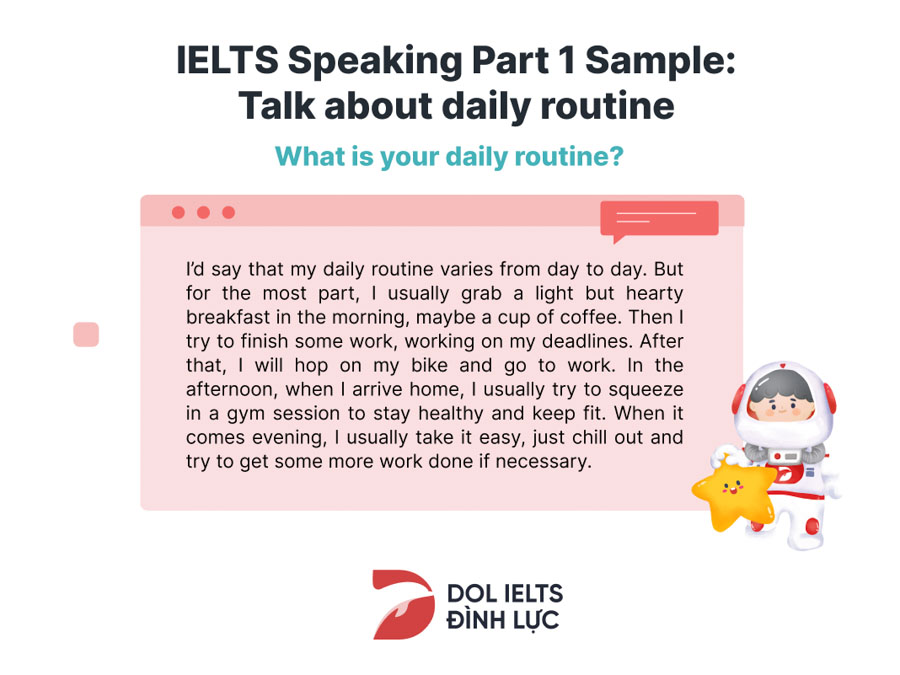
I’d say that my daily routine varies from day to day. But for the most part, I usually grab a light but hearty breakfast in the morning, maybe a cup of coffee. Then I try to finish some work, working on my deadlines. After that, I will hop on my bike and go to work. In the afternoon, when I arrive home, I usually try to squeeze in a gym session to stay healthy and keep fit. When it comes evening, I usually take it easy, just chill out and try to get some more work done if necessary.
1.3 What part of the day do you like most?
As I was saying, I’m a morning person, so I’d say that I enjoy that time frame the most in the day. You know, the feeling when you get up and everyone else is still asleep? It’s so tranquil; I can do whatever I want without worrying about being disrupted. I just so love it.
1.4 Do you think it is important to have a daily routine?
It is, indeed. A good daily routine can help you plan your activities more effectively. Without a regular routine, individuals tend to perform things on the spur of the moment, which can waste time and diminish job productivity. Those who are unorganized, I believe, will profit the most from developing a regular regimen.
1.5 What’s the difference in routine between you and your teenage times?
So, there is a significant contrast between my life before and my current life. You know, when I was a teenager, I had a lot of free time to explore my interests, such as viewing movies or listening to music. My regimen and time management, on the other hand, have gotten more rigid. I've had little free time since graduating from university and starting work as an English instructor.
2. IELTS Speaking Part 2 - chủ đề Saily routine
2.1 Chủ đề 1
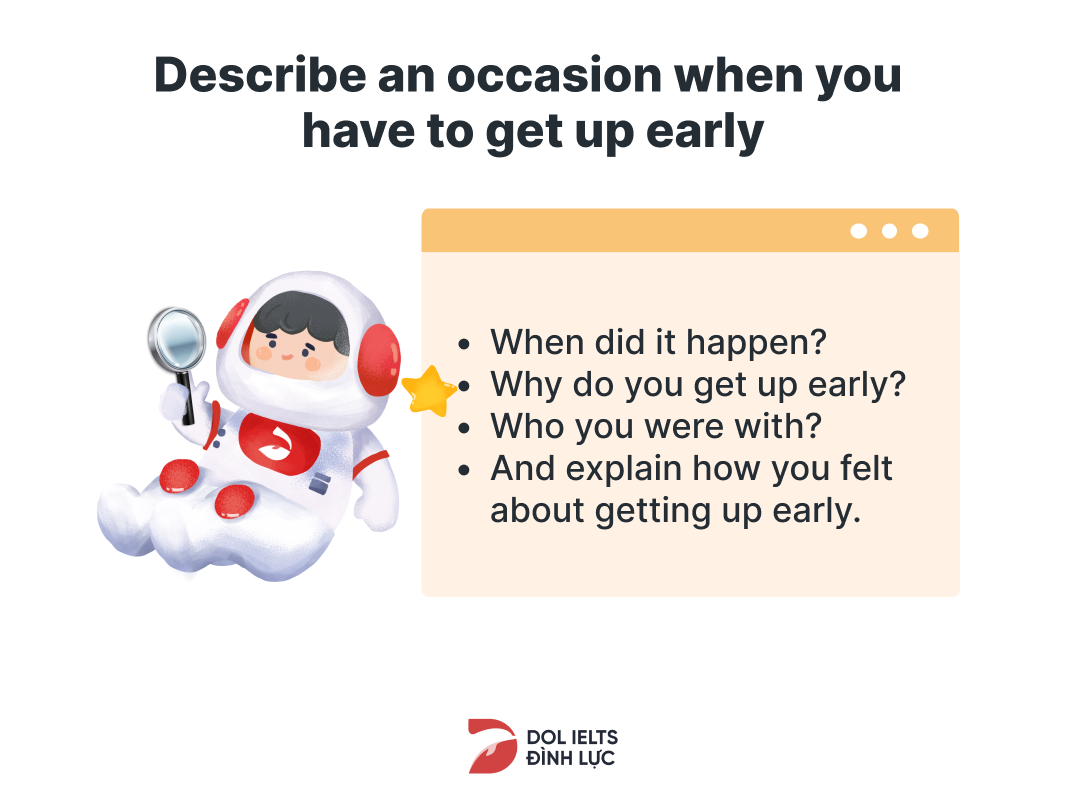
Sample Answer 1 (Band 6.5+)
I'm a night owl who normally gets out of bed between 9 and 10 a.m. every morning. However, there were times when I was compelled to wake up early, and I recall the last time I had to get up early.
I was offered my first job in September of last year. I was a recent graduate at the time. As a result, I had to relocate to Melbourn city in order to attend training classes at the company's headquarters. My boss purchased the plane ticket. She had no option but to schedule an early flight for me at 6 a.m. I was worried about missing the flight as soon as I received the ticket details. I set my phone's alarm and requested my mum to wake me up on time. Even though I was exhausted, I made it. I promptly fell asleep on the aircraft. It was a terrifying experience because it was my first time flying and dealing with all kinds of things at the airport in the early morning on my alone. Fortunately, some kind of people were eager to assist me with my bag, making the situation less terrifying for me.
As a child, I had a bad tendency to stay up late and wake up late. However, I believe I should abandon this practice in order to enhance my health.
Vocabulary:
Compel (v): Cưỡng ép, bắt buộc
Promptly (adv): Ngay lập tức
Terrifying (adj): Đáng sợ
Abandon (v): Bỏ
Enhance (v): Cải thiện
Sample Answer 2 (Band 8.0)
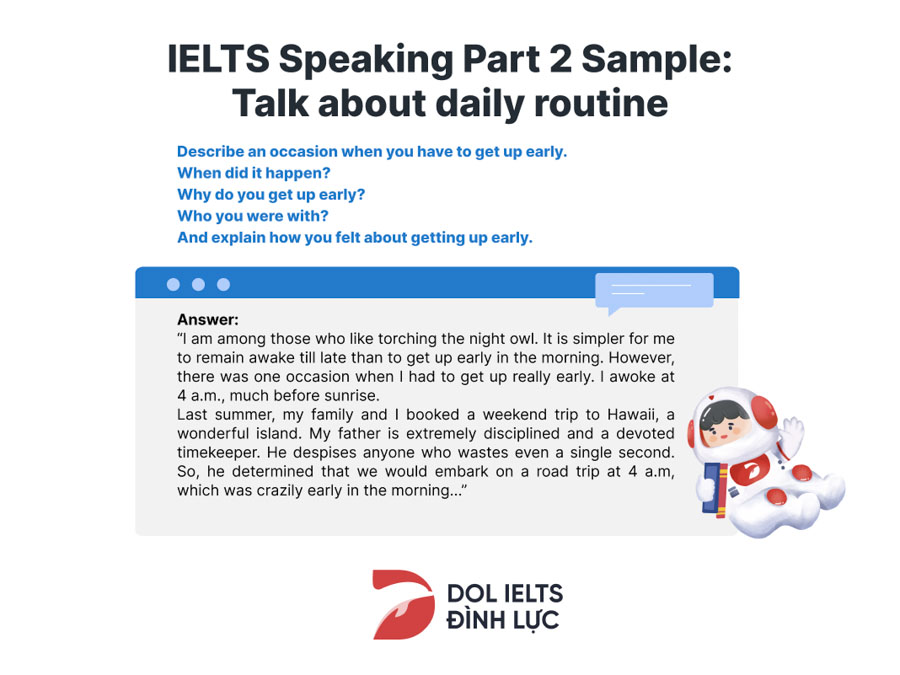
I am among those who like torching the night owl. It is simpler for me to remain awake till late than to get up early in the morning. However, there was one occasion when I had to get up really early. I awoke at 4 a.m., much before sunrise.
Last summer, my family and I booked a weekend trip to Hawaii, a wonderful island. My father is extremely disciplined and a devoted timekeeper. He despises anyone who wastes even a single second. So, he determined that we would embark on a road trip at 4 a.m, which was crazily early in the morning.
While the timing was a bit disappointing, the overall concept of a road trip to Hawaii was the highlight that kept me excited. So I anxiously attempted to sleep early on a Friday night, but to no effect. Regardless, I awoke around 2 a.m. on a Saturday, which was rare for me.
We started our journey at 4 a.m. with me - my sister, and my parents. The early start was a benefit because it offered us more time in Hawaii to participate in various activities. Because of this adventure, I discovered the value of waking up early.
Vocabulary:
Torching the night owl: Thức xuyên đêm
Timekeeper (n): Người theo dõi
Despise (v): Khinh thường
Determined (adj): Quyết tâm
Embark on (v): Khởi hành
Regardless (adv): Dù sao đi nữa
Adventure (n): Chuyến phiêu lưu
2.2 Chủ đề 2
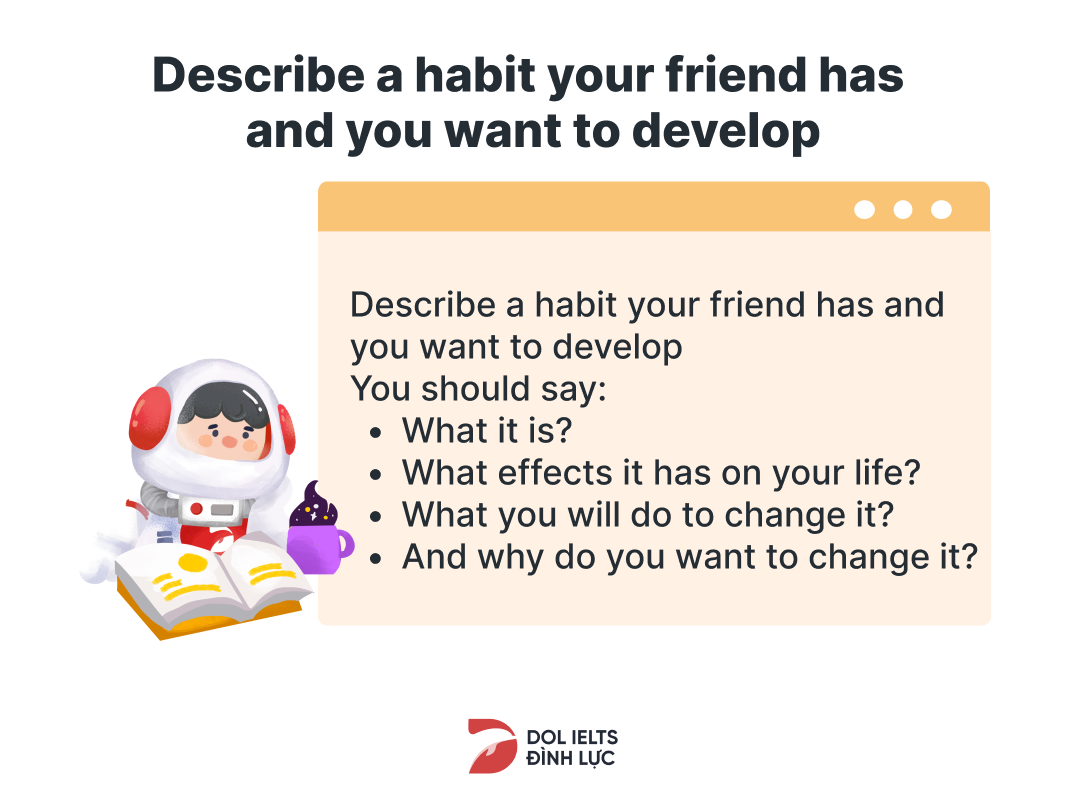
Sample Answer 1 (Band 6.5+)
Let me tell you about a habit I picked up from a buddy and hope to continue developing in the future. Jame is one of my Canadian friends who introduced me to the practice of reading books. I first met him three years ago, when he came to Vietnam for a brief visit and I was his tour guide.
Actually, I had gotten into the habit of reading before I met him, but he taught me how vital it is to establish a goal of pages to read every day rather than doing it on the spur of the moment.
To be honest, his dedication to reading impressed me. I followed his method after learning about it and have seen a significant change in my thoughts since then. Thanks to reading, I discovered I could make better use of my time. Books, aside from being amusing, also help me with my studies, especially when I need to conduct some research in history and culture but don't have enough time in a day. I'm smarter and more educated now that I've increased my reading pace and time. That is why I believe I will strive to expand the number of books I read each year in the future, as well as learn about new professional subjects.
That's all I have to say about my reading habit. I am always thankful to David for being an inspiration to me, and I highly suggest reading to anybody who is still grumbling about their dull existence.
Vocabulary:
Dedication (n): Cống hiến
Amusing (adj): Giải trí
Educated (adj): Có giáo dục
Professional (adj): Chuyên nghiệp, thuộc về công việc
Grumbling (adj): Càu nhàu
Sample Answer 2 (Band 8.0)
In terms of a good habit that my buddy has and I want to develop, I'd like to discuss my sleeping schedule. My friend - Jim, somehow also goes to sleep at 10 in the evening, which is like impossible for me.
To be honest, I used to go to bed early as a youngster because my parents made me. It gradually became my habit till I started working 7 years ago. Since then, I've been staying up late every day to surf the internet or watch popular Netflix shows, which eats up much too much of my sleeping time. As a result, I always wake up tired the next day since my energy has not been entirely replaced.
I recall multiple occasions when I woke up so late that I missed my bus to work, and the outcome was predictable: I was chastised and almost lost my job. Plus, long-term sleep deprivation nearly brought my mental health to a halt. As a result, I am determined to break this bad behavior.
I've done everything to break this awful habit and sleep earlier. However, my efforts were not entirely fruitful, so I recently consulted a buddy - Jim, who advised that I perform some yoga at approximately 9 p.m.
This method had previously helped him conquer his sleeplessness, so he thought it would work on me as well. So, last week, I joined a yoga class to give it a go. According to the yoga center's expert, practicing yoga on a regular basis improves my sleep and helps me fall asleep more quickly.
To be honest, I'm doing this to improve my health since I'm aware of the different negative repercussions that a lack of sleep has on my well-being. I plan to start practicing yoga soon and see if it may assist me to address my condition.
Vocabulary:
Surf the internet: Lướt Internet
Chastise (v): Trừng phạt
Long-term sleep deprivation: Thiếu ngủ dài hạn
Bring something to a halt: Dừng chuyện gì đó lại
Fruitful (adj): Mang lại kết quả tốt
Consult (v): Tham vấn
Conquer (v): Chinh phục
Negative repercussion: Tác động tiêu cực.
3. IELTS Speaking Part 3- chủ đề daily routine
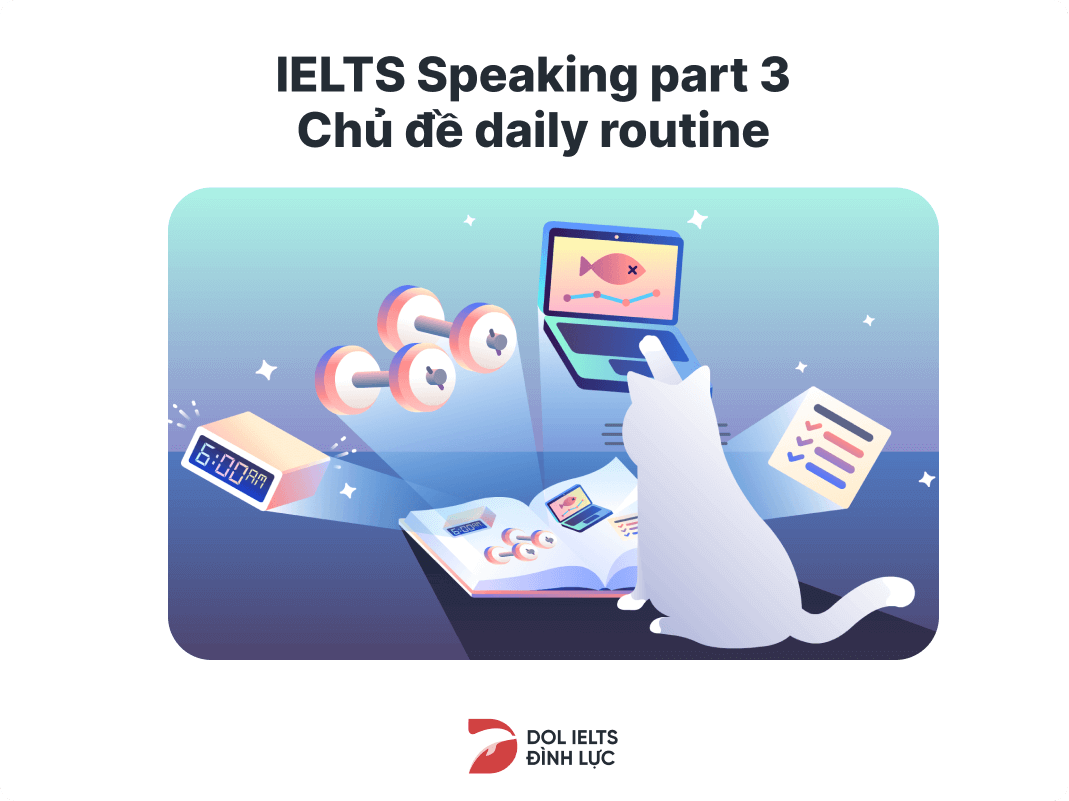
3.1 Do you think people need to have a day-to-day plan? | Do you think people can still do their tasks if they don’t plan them?
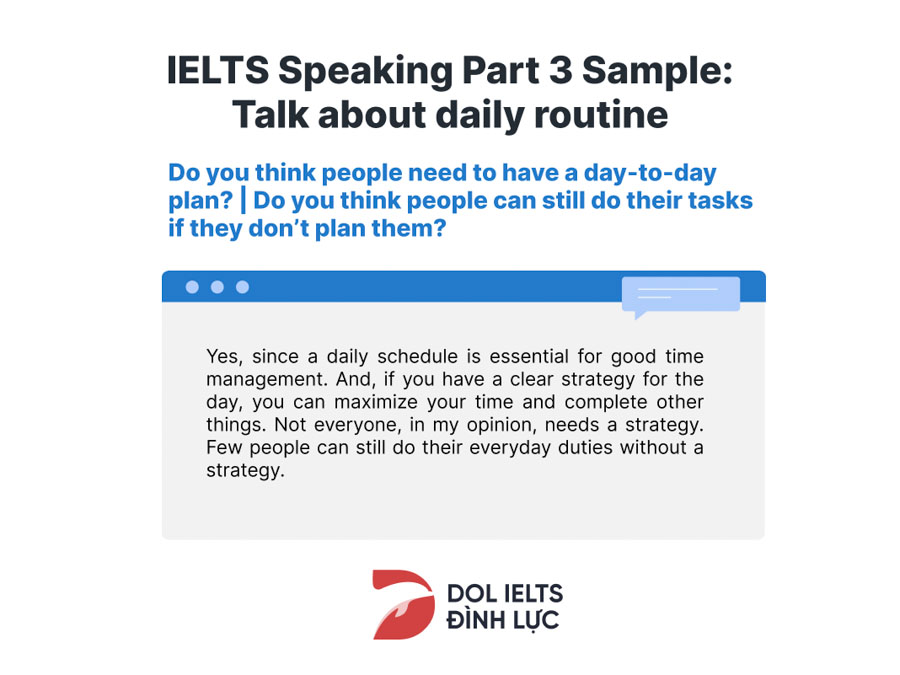
Yes, since a daily schedule is essential for good time management. And, if you have a clear strategy for the day, you can maximize your time and complete other things. Not everyone, in my opinion, needs a strategy. Few people can still do their everyday duties without a strategy.
3.2 Do you think it is possible to learn how to manage your time?
Yes! I arrange and carry out my daily responsibilities, which helps me manage my time. Setting goals and prioritizing them can help people learn to manage their time better. It is advisable to set a time limit for each task and do it as quickly as feasible.
3.3 What are some possible advantages of using a time management app for your phone to help you plan your time?
Some of the potential benefits of time management applications include the capacity to swiftly assess the profitability of our projects, prioritize and produce work on time, decrease stress, make bill payments on time, and so on. The time management program can also help you grasp all of your additional budgets. As a result, they are productive and effective.
3.4 Why do you think some people don’t plan their day in advance?
Some people dread organizing their days in advance because they are concerned that their plans will not function or will be inadequate. While some individuals are terrific at developing plans, they are bad at putting them into action.
4. Cấu trúc thường gặp trong IELTS Speaking topic Daily Routine
To wake up early: Thức dậy vào sáng sớm (chưa rời khỏi giường)
To get up early: Thức dậy sớm (mở mắt ra và ngồi dậy khỏi giường)
To sleep in (Phrasal verb): Dậy trễ, ngủ nướng
To stay up (late)(Phrasal verb): Thức khuya
Some spare time: Một ít thời gian rảnh
To go window shopping: Đi dạo xem hàng hóa tại các cửa hàng
To hang out (with someone)Phrasal verb: Hẹn hò ra ngoài chơi (với ai đó)
To meditate (Verb): Thiền
To get rid of something: Loại bỏ
On a daily basis (Collocation):Hàng ngày
To surf the internet (Collocation): Lướt net
To stream something (Verb): Xem 1 video online
To replenish(Verb): Lấp đầy, đổ đầy
Sleep deprivation (Collocation): Sự thiếu ngủ
Well-being (Noun): Tình trạng sức khỏe tốt
To push something to the verge/edge/brink of something (Collocation): Đẩy (thứ gì đó) tới bờ vực (gì đó)
Collapse (Noun): Sự sụp đổ
Detrimental (Adjective): Có hại
Measure (Noun): Giải pháp
InsomniaNounChứng mất ngủ
To put someone to sleep (Collocation): Đưa ai đó vào giấc ngủ
To adopt (a skill) (Verb): Bắt đầu sử dụng/học (1 kĩ năng)
To be stuck in a rut (Collocation): Bị mắc kẹt ở 1 vị trí và không thăng tiến được.
Giao tiếp bằng mắt là một phần quan trọng của cuộc trò chuyện. Nếu bạn quá ngại ngùng khi nhìn vào mắt giám khảo của mình, hãy chọn một vị trí ngay sau đầu họ trên tường. Tập trung vào nó. Đối với giám khảo, có vẻ như bạn vẫn đang tiếp tục giao tiếp bằng mắt. Tâm lý học cho rằng những người tránh giao tiếp bằng mắt là những kẻ nói dối tiềm năng.
IELTS Examiner’s Tips An Academic Guide to IELTS Speaking and Writing (by Karolina Achirri)
Vậy là DOL đã tổng hợp giúp bạn phần câu hỏi và từ vựng trả lời cho topic “daily routine” IELTS SPEAKING trong cả 3 phần thi. Hi vọng, khi đọc xong bài viết này, các bạn đã có được một sự chuẩn bị tốt hơn cho mình trong phòng thi nói.
Nếu các bạn vẫn còn gặp khó khăn trong việc nâng tầm trình độ tiếng Anh của bản thân hay nâng band điểm IELTS để phục vụ mục đích du học của bản thân, hãy nhanh chóng liên hệ DOL English để được tư vấn trình độ tiếng Anh của bản thân và lộ trình học được cá nhân hoá dựa trên phương pháp Linearthinking độc quyền nhé.
Câu hỏi thường gặp
Làm cách nào để chuẩn bị cho ngày thi nói IELTS?
Thực hành nói tiếng Anh nhiều lần trước khi tham gia kỳ thi
Không nên chỉ tập trung vào từ vựng, ngoài ra cũng cần nắm vững ngữ pháp
Mang theo giấy tờ cá nhân mà kỳ thi yêu cầu
Mặc trang phục khiến bạn cảm thấy thoải mái, tự tin nhất và phù hợp với 1 kỳ thi
Giữ một tinh thần thoải mái, coi bài kiểm tra nói là 1 buổi trò chuyện bình thường với giám khảo
Có những từ vựng nào để nói về thói quen hàng ngày?
Có rất nhiều từ vựng mà bạn có thể sử dụng: Get up (Thức dậy); Wake up (Tỉnh giấc); Wash face (Rửa mặt); Brush teeth (Đánh răng); Have shower (Tắm vòi sen); Get dressed (Thay quần áo); Makeup (Trang điểm); Have breakfast (Ăn sáng); Go to school (Đến trường); Work (Làm việc); Get off work (Tan sở); Go home, get home (Về nhà); Surf the Internet (Lướt mạng); Watch TV (Xem tivi); Do homework (Làm bài tập về nhà); Go out for dinner/ drinks (Đi ăn/ uống bên ngoài); Hang out (Đi chơi); Make dinner (Nấu bữa tối); Go to sleep (Đi ngủ)
Thí sinh có thể uống nước trong khi nói IELTS không?
Thí sinh không được phép mang bất kỳ thức ăn nào vào phòng thi nói IELTS và chỉ được phép lấy nước trong chai trong suốt. Vì vậy, hãy chủ động ăn uống nhẹ trước khi kiểm tra nói IELTS.
Có thể nói yeah trong IELTS speaking không?
Ngoài những từ vựng chính được sử dụng để trả lời đề bài và câu hỏi mà giám khảo đặt ra, thí sinh có thể sử dụng cả từ “yeah" nhằm thể hiện cảm xúc trong câu nói của mình.
Table of content
1. IELTS Speaking Part 1- chủ đề Daily routine
2. IELTS Speaking Part 2 - chủ đề Saily routine
3. IELTS Speaking Part 3- chủ đề daily routine
4. Cấu trúc thường gặp trong
Câu hỏi thường gặp

